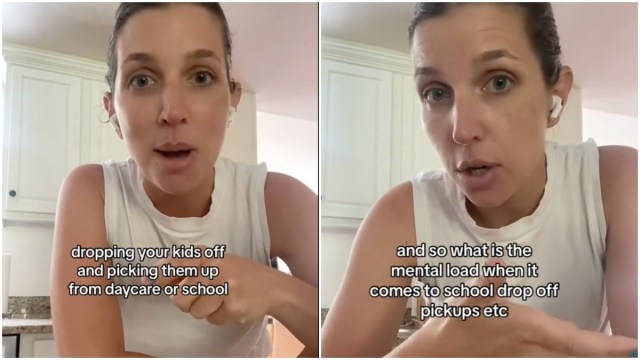In a viral TikTok, a mom explains why doing drop-off and pickup isn’t all that helpful
When it comes to parenting, men are too often praised for doing the bare minimum. Take drop-offs and pickups, for example. A dad who drops off kids and picks them up from school or summer camp gets praised for doing a great job, while a mom doing those things is just doing what a mom is supposed to do. In reality, though, doing drop-offs and pickups isn’t that big of a deal—and it doesn’t even put a dent in the actual mental load that goes into those tasks, as one mom explains in a viral video.
In her video, Paige Turner describes the difference between “labor” and “mental load” in the context of drop-offs and pickups so parents can better understand the difference.
@sheisapaigeturner Episode 2: Dropping your kid off at school or camp is not the mental load. The mental load are all of the small details that go into getting your kid to and from school and with all the things they need for a successful day. Do they need to return their library book? Do they need cash for Pizza day? Is it blue shirt day? Getting your kid to and from school at the right time matters but that is not the mental load. #millennialparents #workingmoms #millennialmoms #domesticlabor #invisiblelabor #thementalloadofmotherhood #thementalload #primaryparent #fairplay #emotionallabor #momof4kids
♬ original sound – Paige
“Dropping your kids off at school, picking them up from school, is not the mental load,” she says. “That is labor that has to get done. Somebody has to do that. Somebody has to coordinate it, right? But that is not the mental load.”
She continues, “So, what is the mental load when it comes to school drop-off, pickups, etc? What is the mental labor that goes into kids going to school, camp, etc.? It’s all the tiny little things that lead up to that kid getting dropped off. It’s the person that knows when school starts and when school ends. Is it a half-day? Late start? What about the bus, when does the bus come? When does the bus drop off at the end of the day? What about on a half-day or a late start day? Do they need lunch on these days?”
As an example, she shares some of the requirements for her kids’ camp this week.
“I just got two handouts for camp for this week of all the information I need to know for every single day of the week,” she says. “Monday, this is just a fun day. Tuesday, pizza day, you need to bring in cash. Cash only, exact change, nothing else. Wednesday? Oh, guess what, the ice cream truck’s coming. It ranges from $2 to $5, more cash.”
While Paige is setting reminders on her phone for all of that information, Dad thinks he’s doing an equal share of the work by driving the kids to and from camp. But that’s not equal, clearly. And even though she’s able to delegate some of the preparatory tasks to her partner, she’s still the one carrying the mental load, because she has to tell him what to do.
In an equal partnership, no parent should need to receive instructions from the other—on any aspect of parenting. Both should be involved equally enough that they have the same level of knowledge about their kids, their lives and activities, and what it takes to run their household. Anything less than that is unequal.











